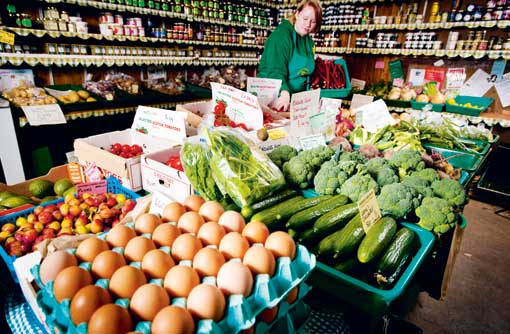Trust is key to boosting farm shop sales

Supermarkets may seem like an all-consuming force these days as they continue to expand, reaching all corners of the UK. However, despite spending the majority of their total food spend in supermarkets, UK consumers are becoming ever aware of the provenance of their food.
There are a number of things farmers can be doing to harness this sentiment, according to speakers at the Farm & More conference in Harrogate, which is partnered by FARMA, the National Farmers’ Retail and Market Association.
Online retailing can still be effective on a small scale
Farm shop owners should be making the most of technology to compete with supermarkets, according to a retail analyst.
Online shopping may seem a preserve of big supermarkets, but it is not difficult for farmers to get in on the act, said Nicky Christie from research and data company CACI.
While it was inconceivable for most farmers to run big online operations, they could take a leaf out of some supermarkets’ books to offer some services online to boost sales.
Customers prefer to shop for food items in store, rather than online, said Ms Christie.
“Food struggles online because consumers want to touch it themselves and don’t trust people to pick it for them,” she said.
But this does not mean there are not opportunities there for farm shops. Understanding your audience and the reasons they shop with you are the first points to look at.
Looking at data on supermarkets’ online offerings, it was clear that services were carefully pitched to their core customer.
“Morrisons is being slated for not being online but how aligned is it with it’s core customers?” Ms Christie asked delegates.
“In fact, it has the highest proportion of infrequent and cautious browsers and offline communities. These make up 50%.”
There had been an emergence of “click and collect” services, she said, which were proving popular with retailers such as Waitrose.
Both this service and online shopping with delivery save customers time, but “click and collect” means customers have to visit the shop to pick up their groceries. This adds another opportunity to sell additional impulse items.
“Click and collect is a good way of getting people into store. When they come and collect their goods, they’re waiting for you to go upstairs and get them, and what do they do? They shop,” said Ms Christie.
Click and collect services also mean customers can collect their shopping out of hours, or from a more central location using drop boxes. Customers can order their shopping and get a pin number to collect it from an unmanned box.
However, shoppers are distrustful of shopping online where the brand is not already known, said Ms Christie.
“You need brand awareness for people to trust you online,” she said. Waitrose was a good example of this, as their online sales are proportionally much higher than many other retailers. “When they’re buying at Waitrose they’re buying trust.”
Build a brand to build trust
Farmers must work hard to build a presence in the market and a good reputation, said consultant Gareth Jones from Lloyds Europa and FARMA. Supermarkets were very good at showing customers good things they were doing but farm shops do not have the same resources.
“It’s more difficult to develop a trusted brand as you have to tick so many boxes,” he said.
Farm shop owners and managers need a broad set of skills to do this. Some farm shops have become very sophisticated businesses, some worth more than £10m.
Design is at the heart of branding, said Mr Jones, as consumers have become very used to good design. “This is another thing supermarkets do very well.
“Farmers should be looking at the retail business and thinking ‘how can we improve?’ “
While there are some areas that different businesses need to look at, such as quality of food and service levels, all farm shops should be looking at design.
A design consultant may be a good investment, but is not completely necessary, he said.
Pick your own resurgence
One trend which has become more visible in the past few years is a revival of “pick your own”, the conference heard.
“If we’d have had a better summer, pick your own would have done very well last year,” said Mr Jones.
Sales of primary products have started to exceed added value products in farm shops, he said. For example, one farm shop owner used to sell a lot of apple pies, but has found that customers are increasingly interested in the apples.
In the USA, pick your own had been very successful in 2012, where the weather had been suitable – a trend which is expected to be mirrored in the UK in 2013 if the rain holds off.
The reason for this is younger consumers taking a greater interest in the origins of their food.
“In the direct sales sector we’ve seen a lot of interest from young people, for example those in their twenties and thirties, and young families.
“These consumers will go out of their way to get good food,” he said.
High welfare is also sought after amongst many younger consumers. “They are particularly interested in the welfare of meat,” added Mr Jones.
Farm shops see sales boost thanks to horsemeat scandal
